-
 Bitcoin
Bitcoin $104,093.1199
0.77% -
 Ethereum
Ethereum $2,508.1404
-0.13% -
 Tether USDt
Tether USDt $1.0000
0.00% -
 XRP
XRP $2.3627
-2.50% -
 BNB
BNB $650.6914
-0.72% -
 Solana
Solana $172.3789
-0.62% -
 USDC
USDC $0.9998
-0.01% -
 Dogecoin
Dogecoin $0.2312
-3.01% -
 Cardano
Cardano $0.8091
-1.58% -
 TRON
TRON $0.2647
1.37% -
 Sui
Sui $4.0149
-0.58% -
 Chainlink
Chainlink $16.9853
-0.04% -
 Avalanche
Avalanche $24.6408
-3.09% -
 Stellar
Stellar $0.3074
-0.88% -
 Shiba Inu
Shiba Inu $0.0...01585
-1.53% -
 Hedera
Hedera $0.2059
-3.84% -
 Toncoin
Toncoin $3.3636
-1.19% -
 Hyperliquid
Hyperliquid $24.9497
-1.85% -
 Bitcoin Cash
Bitcoin Cash $409.0966
-3.20% -
 Polkadot
Polkadot $5.0928
-0.77% -
 Pi
Pi $1.1100
50.04% -
 UNUS SED LEO
UNUS SED LEO $8.3637
-2.10% -
 Litecoin
Litecoin $99.9699
-3.90% -
 Monero
Monero $334.1963
3.85% -
 Pepe
Pepe $0.0...01356
2.26% -
 Bitget Token
Bitget Token $4.8622
0.08% -
 Dai
Dai $0.9999
-0.01% -
 Ethena USDe
Ethena USDe $1.0002
-0.01% -
 Uniswap
Uniswap $6.9041
-0.32% -
 Bittensor
Bittensor $452.3936
-1.53%
What is the difference between a Dogecoin wallet address and a private key?
A Dogecoin wallet address, like an email address, is publicly shareable for receiving DOGE, while the private key, a secret code, is crucial for authorizing transactions; losing it means irreversible loss of funds.
Feb 27, 2025 at 09:36 pm
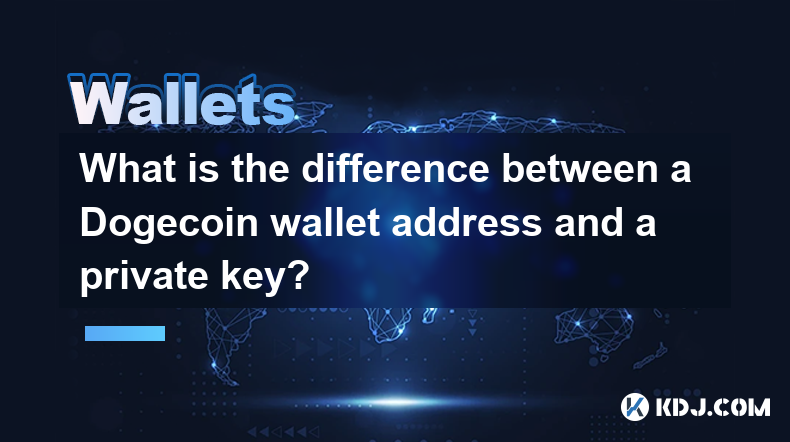
What is the difference between a Dogecoin wallet address and a private key?
Key Points:
- Dogecoin Wallet Address: A publicly shareable identifier, analogous to an email address, used to receive DOGE. It's derived from your public key and doesn't grant access to your funds. Sharing it poses no security risk.
- Dogecoin Private Key: A secret, cryptographic code that proves your ownership of the Dogecoin associated with a specific address. It's crucial for signing transactions and authorizing the movement of your DOGE. Losing or compromising it means irreversible loss of access to your funds.
- Relationship: The private key is mathematically linked to the public key, which in turn generates the Dogecoin wallet address. The address is derived from the public key, while the private key allows you to spend the Dogecoin associated with that address. They work together to facilitate secure and verifiable transactions on the Dogecoin blockchain.
- Security Implications: The private key is the most sensitive piece of information in your Dogecoin ownership. Protecting it is paramount to preventing theft. The wallet address, conversely, can be shared freely without compromising security.
Understanding Dogecoin Wallet Addresses
- A Dogecoin wallet address is a unique identifier, much like an email address or a bank account number. It's a string of alphanumeric characters that serves as the destination for incoming Dogecoin transactions. This address is publicly visible and can be shared with anyone who wants to send you DOGE. Think of it as your publicly visible postal address for your Dogecoin. You can find your wallet address within your chosen Dogecoin wallet software or exchange. These addresses are generated cryptographically from your public key, a component of your cryptographic key pair. This key pair is fundamental to the security and functionality of the Dogecoin network. The public key is a long string of characters derived from the private key through complex mathematical operations. It's designed to be computationally infeasible to derive the private key from the public key. This inherent asymmetry is what ensures the security of your Dogecoin. The wallet address itself doesn't contain any information that allows anyone to access your Dogecoin; it simply acts as a label for a specific location on the Dogecoin blockchain where your Dogecoin is stored. The process of creating a wallet address involves sophisticated cryptographic algorithms ensuring its uniqueness and security. This ensures that each address is distinct, preventing accidental or malicious overlap of funds. The length and complexity of the Dogecoin wallet address are critical in minimizing the chance of collisions or accidental duplication. Different Dogecoin wallets might present the address in slightly varying formats (e.g., with or without prefixes), but the core alphanumeric string remains the essential part for receiving DOGE. Understanding this distinction is fundamental to securely managing your Dogecoin. Sharing your Dogecoin wallet address is safe; it's like giving someone your email address – they can send you messages (Dogecoin), but they cannot access your inbox (your private keys and funds).
- The Importance of Accurate Address Entry: When sending Dogecoin, it's critical to ensure the recipient's wallet address is accurately entered. A single typographical error can result in the irreversible loss of your Dogecoin. The Dogecoin network doesn't have a mechanism to recover funds sent to an incorrect address. Always double-check the address before confirming any transaction. Many wallets offer features to verify the address, minimizing the risk of errors. This verification might involve visually comparing the address with a QR code or employing checksum verification techniques to detect potential errors. The consequence of sending Dogecoin to the wrong address is the complete loss of those coins. There's no central authority or customer support to reverse the transaction. This highlights the critical importance of careful attention to detail when handling Dogecoin transactions. It’s also wise to utilize the copy-paste function instead of manual entry to minimize typing errors. The immutability of the blockchain underscores the permanent nature of any transaction.
- Wallet Address Formats: While the fundamental structure remains consistent, minor variations in formatting might exist depending on the wallet software or exchange used. Some wallets may add prefixes or suffixes to the core address string. However, the core alphanumeric sequence remains the crucial identifying component. This ensures compatibility across various Dogecoin platforms and wallets. The fundamental aspect of the address, its ability to uniquely identify a specific location on the blockchain for Dogecoin storage, remains consistent regardless of minor formatting differences. These minor formatting differences are primarily cosmetic and don't affect the functionality of the address.
Understanding Dogecoin Private Keys
- A Dogecoin private key is a long, randomly generated string of characters. It's a cryptographic secret that acts as proof of ownership of your Dogecoin. Unlike your public address, your private key should never be shared with anyone. It's the key that unlocks your access to your Dogecoin. Losing your private key means losing your Dogecoin irretrievably. There's no way to recover it from the Dogecoin network. The private key is the core component of your digital identity on the Dogecoin network. It’s the cryptographic signature that authenticates your transactions. Every transaction you initiate requires the signature generated using your private key. This signature proves that you, and only you, have authorized the transfer of your Dogecoin. The security of your private key is paramount; its compromise results in the complete loss of control over your Dogecoin. The strength of the private key lies in its randomness and length. Weakly generated private keys are more vulnerable to brute-force attacks. The private key is mathematically related to your public key, and therefore, your wallet address. However, deriving the private key from the public key is computationally infeasible, ensuring the security of your funds.
- Private Key Storage and Security: Storing your private key securely is of utmost importance. Never store it digitally on devices that are not securely protected, such as on a computer that isn't regularly backed up and secured with strong passwords. Hardware wallets are generally considered the most secure method of storing private keys. These wallets use specialized hardware to store your private key offline, protecting it from malware and other digital threats. Software wallets offer convenience but pose higher risks if compromised. It’s important to use a reputable wallet and follow best practices for securing the wallet software itself. Never share your private key with anyone, under any circumstances. Legitimate organizations or individuals will never ask for your private key. Any request for your private key is a clear indication of a scam. Consider using multiple backup methods for your private key, keeping copies in separate, secure locations. This safeguards against loss or damage to a single backup. Regularly review your security measures to ensure that your private key remains adequately protected. The security of your private key directly correlates to the security of your Dogecoin. Maintaining the confidentiality of your private key is crucial for preventing theft or loss of your funds. Regularly updating your wallet software and operating system is another critical security measure.
- The Importance of Backup and Recovery: Losing your private key is equivalent to losing your Dogecoin permanently. Therefore, creating multiple backups and securely storing them is crucial. This involves creating copies of your seed phrase or private key and storing them in physically separate and secure locations. Consider using a combination of digital and physical backups to minimize the risk of loss due to device failure or theft. This redundancy ensures that you can regain access to your Dogecoin even if one backup is compromised or lost. Understanding the recovery process for your chosen wallet is equally important. Familiarize yourself with the steps involved in restoring your wallet from a backup. This preparedness is essential for mitigating the consequences of a lost or compromised private key. The process may vary depending on the type of wallet you are using, whether it's a hardware wallet, software wallet, or a paper wallet. Always ensure you have access to reliable backups that are stored securely and are regularly reviewed.
- Private Key Formats: Private keys are typically represented as long hexadecimal strings or mnemonic phrases (seed phrases). The format depends on the wallet software used. A mnemonic phrase is a user-friendly representation of the private key, consisting of a sequence of words. However, the underlying cryptographic principle remains the same. Understanding the format of your private key is essential for proper backup and recovery. Always follow the instructions provided by your wallet software to correctly interpret and manage your private key. Misinterpreting or incorrectly managing your private key can result in the irreversible loss of your Dogecoin. The format of the private key is crucial for maintaining the security and usability of your Dogecoin. Different wallets may employ various methods for generating, storing, and managing private keys.
FAQs
Q: Can I share my Dogecoin wallet address without compromising my security?
A: Yes, your Dogecoin wallet address is analogous to your email address. Sharing it poses no security risk. It simply allows others to send you DOGE.
Q: What happens if I lose my Dogecoin private key?
A: Losing your private key means irreversible loss of access to your Dogecoin. There is no recovery mechanism.
Q: Are there different types of Dogecoin wallets? How do I choose the right one?
A: Yes, there are various types, including software wallets (desktop, mobile), hardware wallets, and paper wallets. The best choice depends on your security needs and technical proficiency. Hardware wallets offer the highest security, while software wallets provide greater convenience. Paper wallets offer offline security but require careful handling.
Q: How can I ensure the security of my Dogecoin private key?
A: Store your private key offline (ideally in a hardware wallet), never share it, and create multiple backups stored in separate secure locations. Use strong passwords and keep your wallet software updated.
Q: What should I do if I suspect my private key has been compromised?
A: Immediately secure your funds by transferring your Dogecoin to a new wallet with a new private key. Report the incident to relevant authorities if applicable and monitor your accounts closely.
Q: Can I recover my Dogecoin if I forget my private key or seed phrase?
A: No, there's no central authority or recovery mechanism for Dogecoin private keys. Loss of your private key equates to permanent loss of your Dogecoin.
Q: What are the security risks associated with using online exchanges to store my Dogecoin?
A: Online exchanges are vulnerable to hacking and other security breaches. While convenient, storing significant amounts of Dogecoin on exchanges increases your risk of loss. Consider using a personal wallet for long-term storage.
Q: How can I verify the authenticity of a Dogecoin wallet or exchange?
A: Research thoroughly, check for security audits, and look for reviews from reputable sources. Be wary of unverified or poorly reviewed platforms. Avoid platforms with questionable security practices.
This detailed explanation provides a comprehensive understanding of the differences between Dogecoin wallet addresses and private keys, along with crucial security considerations. Remember, the security of your Dogecoin hinges on the proper handling and safeguarding of your private key.
Disclaimer:info@kdj.com
The information provided is not trading advice. kdj.com does not assume any responsibility for any investments made based on the information provided in this article. Cryptocurrencies are highly volatile and it is highly recommended that you invest with caution after thorough research!
If you believe that the content used on this website infringes your copyright, please contact us immediately (info@kdj.com) and we will delete it promptly.
- Whale Accumulation Fuels Dogecoin Rise
- 2025-05-12 05:10:13
- title: One major crypto exploit is striking the BNB Chain ecosystem
- 2025-05-12 05:10:13
- After an Explosive Breakout That Took Bitcoin Beyond the $100,000 Mark
- 2025-05-12 05:05:13
- As Crypto Markets Rally into Mid-2025, Investors Are Zeroing in on Projects Delivering Real Momentum
- 2025-05-12 05:05:13
- Savvy investors locked in gigantic yields from last year's Dogecoin and Cardano rallies.
- 2025-05-12 05:00:12
- Recent Surge of Cardano (ADA) Activity Among Whale Investors Has Catalyzed the Token's Price Movement
- 2025-05-12 05:00:12
Related knowledge
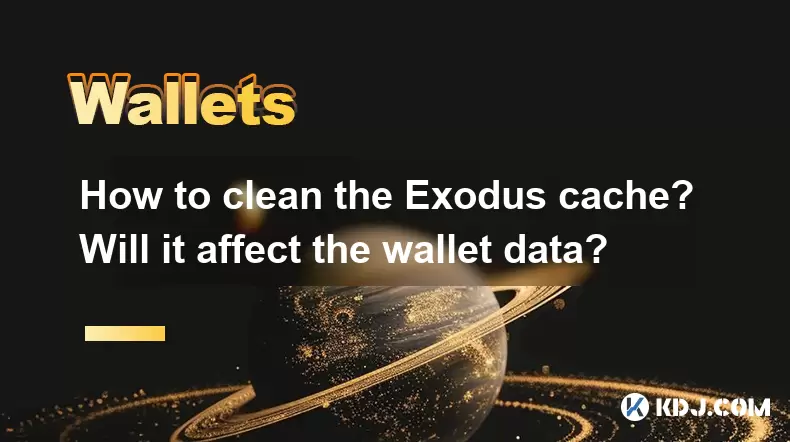
How to clean the Exodus cache? Will it affect the wallet data?
May 11,2025 at 12:49pm
Cleaning the cache in the Exodus wallet is a routine maintenance task that can help improve the performance of the application. However, many users are concerned about whether this action will affect their wallet data. In this article, we will guide you through the process of cleaning the Exodus cache and explain why it does not impact your wallet data....
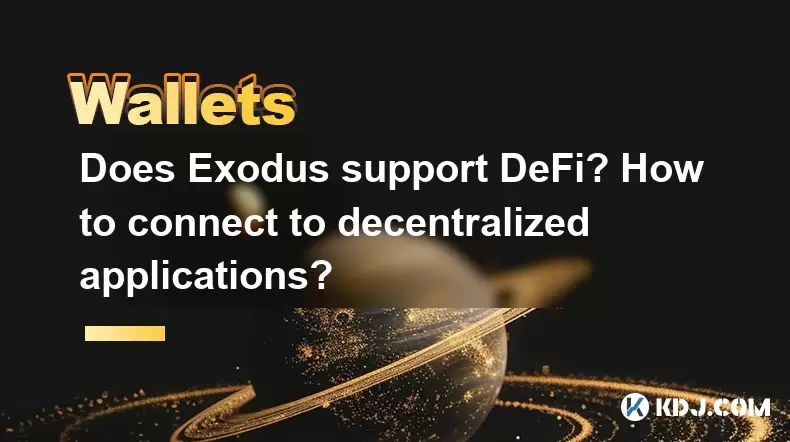
Does Exodus support DeFi? How to connect to decentralized applications?
May 10,2025 at 08:36pm
Does Exodus Support DeFi? How to Connect to Decentralized Applications? Exodus is a popular cryptocurrency wallet known for its user-friendly interface and support for a wide range of cryptocurrencies. However, one of the frequently asked questions among users is whether Exodus supports DeFi (Decentralized Finance) and how to connect to decentralized ap...
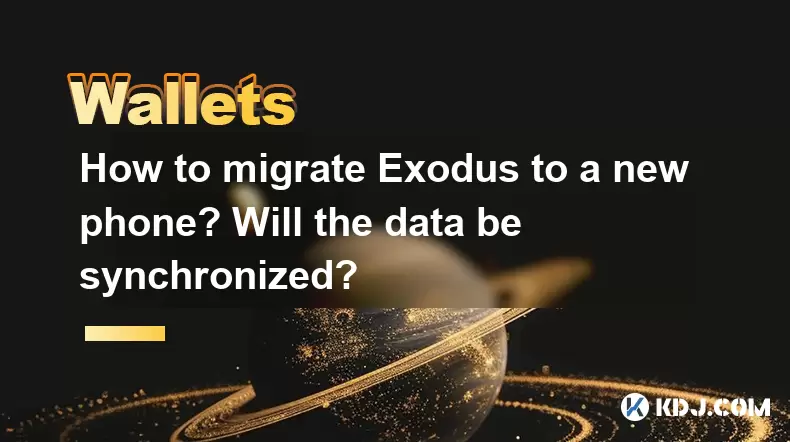
How to migrate Exodus to a new phone? Will the data be synchronized?
May 11,2025 at 03:28pm
Migrating your Exodus wallet to a new phone is a straightforward process that ensures your cryptocurrency data remains secure and accessible. This guide will walk you through the steps to successfully transfer your wallet to a new device, and address whether your data will be synchronized during the process. Preparing for the MigrationBefore you begin t...
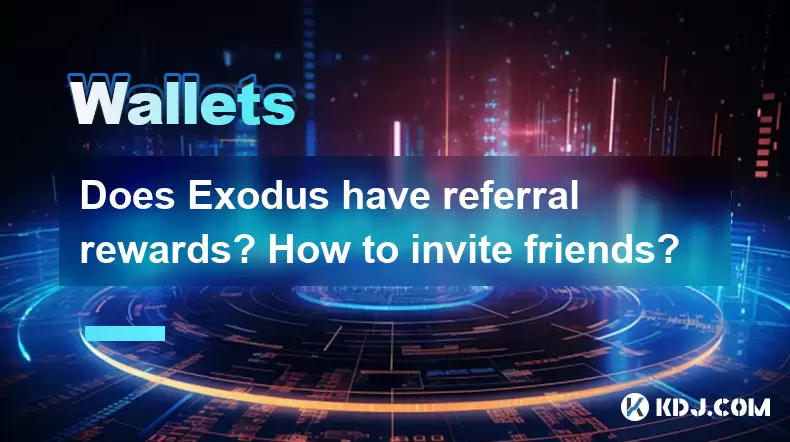
Does Exodus have referral rewards? How to invite friends?
May 09,2025 at 10:01pm
Does Exodus have referral rewards? How to invite friends? Exodus, a popular cryptocurrency wallet, has gained a significant user base due to its user-friendly interface and robust features. One common question among users is whether Exodus offers referral rewards and how to invite friends to join the platform. In this article, we will explore these topi...
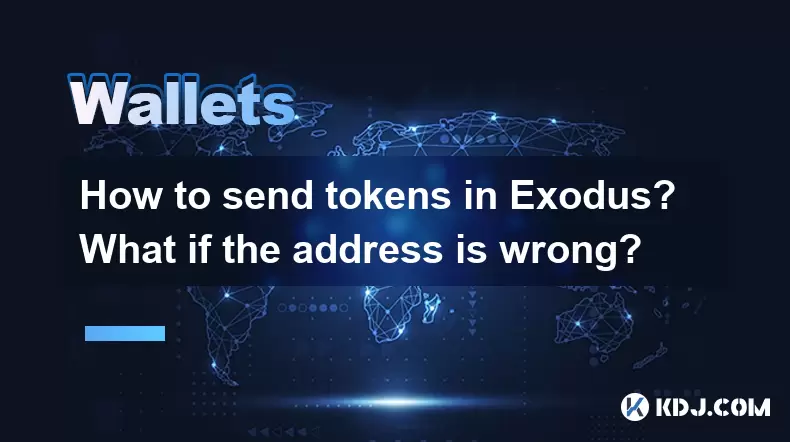
How to send tokens in Exodus? What if the address is wrong?
May 11,2025 at 07:35pm
Sending tokens in Exodus can be a straightforward process if you follow the correct steps. However, it's crucial to be cautious, especially when entering the recipient's address. This guide will walk you through the process of sending tokens in Exodus and what to do if you mistakenly enter the wrong address. Preparing to Send TokensBefore you begin send...

Does Exodus support multi-signature? How to set up multi-person management?
May 11,2025 at 12:01am
Does Exodus Support Multi-Signature Wallets?Exodus, a popular cryptocurrency wallet known for its user-friendly interface, does not currently support multi-signature wallets. Multi-signature (multi-sig) wallets are a type of wallet that requires more than one private key to authorize a transaction, enhancing security by requiring multiple parties to agr...

How to clean the Exodus cache? Will it affect the wallet data?
May 11,2025 at 12:49pm
Cleaning the cache in the Exodus wallet is a routine maintenance task that can help improve the performance of the application. However, many users are concerned about whether this action will affect their wallet data. In this article, we will guide you through the process of cleaning the Exodus cache and explain why it does not impact your wallet data....

Does Exodus support DeFi? How to connect to decentralized applications?
May 10,2025 at 08:36pm
Does Exodus Support DeFi? How to Connect to Decentralized Applications? Exodus is a popular cryptocurrency wallet known for its user-friendly interface and support for a wide range of cryptocurrencies. However, one of the frequently asked questions among users is whether Exodus supports DeFi (Decentralized Finance) and how to connect to decentralized ap...

How to migrate Exodus to a new phone? Will the data be synchronized?
May 11,2025 at 03:28pm
Migrating your Exodus wallet to a new phone is a straightforward process that ensures your cryptocurrency data remains secure and accessible. This guide will walk you through the steps to successfully transfer your wallet to a new device, and address whether your data will be synchronized during the process. Preparing for the MigrationBefore you begin t...

Does Exodus have referral rewards? How to invite friends?
May 09,2025 at 10:01pm
Does Exodus have referral rewards? How to invite friends? Exodus, a popular cryptocurrency wallet, has gained a significant user base due to its user-friendly interface and robust features. One common question among users is whether Exodus offers referral rewards and how to invite friends to join the platform. In this article, we will explore these topi...

How to send tokens in Exodus? What if the address is wrong?
May 11,2025 at 07:35pm
Sending tokens in Exodus can be a straightforward process if you follow the correct steps. However, it's crucial to be cautious, especially when entering the recipient's address. This guide will walk you through the process of sending tokens in Exodus and what to do if you mistakenly enter the wrong address. Preparing to Send TokensBefore you begin send...

Does Exodus support multi-signature? How to set up multi-person management?
May 11,2025 at 12:01am
Does Exodus Support Multi-Signature Wallets?Exodus, a popular cryptocurrency wallet known for its user-friendly interface, does not currently support multi-signature wallets. Multi-signature (multi-sig) wallets are a type of wallet that requires more than one private key to authorize a transaction, enhancing security by requiring multiple parties to agr...
See all articles





















































































